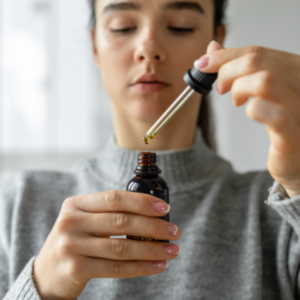
Gray skies, a constant chill in the air, and a pervasive sense of sadness that seems to settle deep within… It’s no wonder that changing of the seasons can take its toll on our mental well-being. But let’s switch on a ray of possibility.
Feeling a bit gloomy when the days grow shorter and the chill of winter sets in? You’re not alone. Many of us experience a mood slump during the colder months, a dreaded phenomenon known as seasonal depression or seasonal affective disorder (SAD). Can CBD, that trending natural compound you’ve been hearing about, offer a glimmer of hope in combating these winter blues?
Take a close look at seasonal depression, unpacking the science behind it, exploring the ways in which reduced sunlight disruptions our body’s internal clock and how CBD could help. As always, let’s start with the basics.
What is CBD?
CBD, a type of cannabidiol, is a natural compound found in the cannabis plant. But don’t fret, it’s not the same as its famous cousin, THC, which is responsible for that well-known and beloved weed high.
CBD is renowned for its potential health benefits without inducing that mind-altering buzz. Essentially, you can gain the benefits of smoking weed but without the high.
Now, let’s get a little scientific… CBD interacts with our body’s endocannabinoid system (ECS), which is a network of receptors that help maintain balance and harmony. Think of it as your body’s orchestra conductor, ensuring all systems are playing in perfect harmony. When CBD enters the body, it interacts with these receptors, influencing a wide range of physical and physiological processes.
CBD comes in various forms, from oils and tinctures to capsules and topicals. Each form offers its own unique benefits and methods of consumption, catering to your preferences and specific needs.
CBD has been used as a potential aid for seasonal depression. While more research is needed in this area, studies suggest that CBD may help alleviate symptoms associated with seasonal affective disorder (SAD). Its interaction with receptors in the ECS could positively impact mood regulation, reduce anxiety, and promote an overall sense of well-being.
What is Seasonal Depression?
Essentially, seasonal depression, also known as seasonal affective disorder (SAD), is a type of depression that typically occurs during certain seasons, most commonly in the fall and winter months.
Now, you might be wondering, why do some of us experience these seasonal blues. Well, science suggests that reduced exposure to sunlight plays the most significant role. Sunlight helps regulate our body’s internal clock and affects the production of hormones like serotonin, which is responsible for regulating mood. With shorter days and less natural light during winter, these hormonal changes can disrupt our delicate balance and contribute to feeling down.
The symptoms of seasonal depression can vary but often include feelings of sadness, fatigue, changes in appetite, difficulty concentrating, and even social withdrawal. It can be a real struggle but fear not, there are ways to manage it.
One potential path for relief is tied to our friendly compound, CBD. Although research in this area is still evolving, some studies have shown promise in using CBD as a tool to alleviate symptoms associated with seasonal depression. As CBD interacts with the endocannabinoid system, it may have a positive impact on mood regulation and reduce anxiety, factors that often accompany SAD.
However, it’s important to note that CBD alone may not be a complete solution. It’s best used as part of a comprehensive treatment plan, which may include other therapies like light therapy, exercise, counselling, and self-care practices. There’s no one-size-fits-all approach when it comes to mental health.
While seasonal depression can be difficult, there’s a range of tools and strategies available to help combat it. Together, we’ll shed some light on the darkness and find our way back to happier days through natural remedies.

Can CBD Help Seasonal Depression?
Let’s delve into the scientific side of this topic and uncover the potential benefits that CBD may offer to those experiencing the winter blues.
While research on CBD and seasonal depression is still in its early stages, some studies indicate the potential of CBD as a complementary therapy in managing the symptoms of SAD. CBD’s ability to interact with serotonin receptors in the brain suggests it may have an impact on regulating serotonin levels, which could contribute to improved mood and overall well-being.
Additionally, CBD has been found to have anxiolytic properties, meaning it may help reduce anxiety levels. Since anxiety often accompanies seasonal depression, the potential anti-anxiety effects of CBD could prove beneficial for individuals struggling with SAD.
However, it’s vital to approach CBD as just one part of a treatment plan. Seasonal depression is a complex condition, and no single solution works for everyone. Combining CBD, other helpful herbal remedies, activities, etc, can help tremendously. With other evidence-based approaches such as light therapy, regular exercise, counselling, and self-care practices may offer a more holistic and effective approach to managing seasonal depression.
When considering CBD for seasonal depression, it’s essential to consult with a healthcare professional who can guide you through the process. They can help determine the appropriate dosage, method of consumption, and potential interactions with any existing medications you may be taking. Your healthcare provider will assess your unique circumstances and work with you to create an individualized treatment plan. However, CBD has no known bad side effects. That being said, taking this supplement has ultimately no risk, depending on how you are consuming it. Of course, smoking CBD weed has its risks, whereas taking CBD oil doesn’t seem to have any.
As with any health-related decision, it’s crucial to prioritize your safety and well-being. Ensure you choose high-quality CBD products from reputable sources. It is not a cure-all solution, and what works for one person may not work for another.
As always, listen to your body and give it what it is asking for. Your body is constantly sending you signals, trying to communicate its needs. Reach out to your loved ones, seek professional help, and together, let’s navigate the seasons with resilience, understanding, and hope. Most of all, persevere because you are not alone! Everything is as temporary as the passing seasons.





